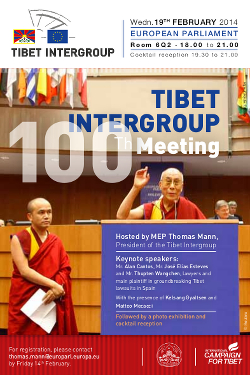 On February 19, the offices of MEP Thomas Mann (Germany, EPP), the International Campaign for Tibet (ICT) and the Office of Tibet in Brussels jointly organized a special event to mark the 100th meeting of the European Parliament’s Tibet Intergroup.
On February 19, the offices of MEP Thomas Mann (Germany, EPP), the International Campaign for Tibet (ICT) and the Office of Tibet in Brussels jointly organized a special event to mark the 100th meeting of the European Parliament’s Tibet Intergroup.
His Holiness the Dalai Lama sent a message addressing the Intergroup’s meeting, underlining how the future of Tibet should concern humanity at large, not only the Tibetan people. Ahead of Chinese President Xi Jinping’s first official visit to Europe, the Dalai Lama also stressed that it is the international community’s responsibility to work on resolving the Tibetan issue through a peaceful and constructive dialogue with China (see the message at http://www.savetibet.org/european-parliament-marks-its-100th-meeting-on-tibet-with-strong-statements-and-a-message-from-his-holiness-the-dalai-lama/).
The event mixed politics, human rights and a rich cultural programme, including a Tibetan prayer and Tibetan dance and music performance. Besides Thomas Mann, who chaired the meeting, several MEPs, such as Ryszard Czarnecki (Poland, ECR), Lidia Geringer De Oedenberg (Poland,S&D), Nathalie Griesbeck (France, ALDE), Eva Lichtenberger (Austria, Greens), Edward MacMillan-Scott (UK, ALDE) and Csaba Sogor (Romania, EPP), gave statements about their connection to Tibet and the importance of the European Parliament’s Intergroup.
Mr. Matteo Mecacci, ICT’s President, addressed the audience and formally launched ICT’s campaign ahead of the European Parliament’s elections, ‘2014 for Tibet’ (http://www.2014fortibet.eu), thanking the European Parliament and the Tibet Intergroup for its active support of the Tibetan cause for 25 years and pointing out the importance of the Intergroup’s reestablishment after the European elections of May 2014. Mr Mecacci said: “It is very important for Europeans to identify causes with which we can unite as European citizens, in which we can reassert not only the importance of Tibetan issue but also our own values, what we stand for.”
Special Representative of the Dalai Lama in Europe Mr. Kelsang Gyaltsen gave a statement in which he expressed his deep gratitude to the European Parliament for its support for Tibet, and about the current political situation, drawing hope from the spirit of resilience of the Tibetan people.
Keynote speakers were Mr. José Elías Esteve Moltó, main research lawyer and author of the two ground-breaking law suits in Spain, Mr. Alan Cantos from Comité de Apoyo Al Tibet (CAT) in Madrid, Spain’s Tibet Support Committee, which has pioneered the two cases, and Mr. Thubten Wangchen, Tibetan Parliamentarian and co-plaintiff. They highlighted the fact that cases such as the Tibet law suits in Spain, culminated with orders of arrest being issued in Madrid for five former Chinese leaders, cannot be considered merely symbolic but that their significance – and the significance of universal jurisdiction as a whole – is about truth, redress for victims of human rights abuses and accountability. Quoting Council decision 2003/335/JHA on the investigation and prosecution of genocide, crimes against humanity and war crimes (http://eur-lex.europa.eu/LexUriServ/LexUriServ.do?uri=OJ:L:2003:118:0012:0014:EN:PDF), Mr. Esteve said that “international crimes must not go unpunished” and called upon members of the European Parliament to take action against and publicly voice their concern about the bill proposed by the Spanish government after direct Chinese pressure with the aim of reforming Spanish law on universal jurisdiction and substantially restricting its application.
On February 10, over 90 NGOs, including ICT and the Spanish Tibet Support committee, signed a joint NGO statement, urging the Spanish government to uphold its international obligations and ensure that any reforms to its universal jurisdiction laws are consistent with international law (http://fidh.org/IMG/pdf/ngo_joint_statement_ujreform_spain_en_.pdf).
During the meeting, several MEPs signed ICT’s pledge targeting candidates to the European elections to take a stand for Tibet during the next European Parliamentary mandate should they be elected. This was followed by the screening of an ICT video, shot during the 2013 EU Tibetan Youth Leadership Program, a 3-day capacity building program aimed at training Tibetan students residing in Europe to become advocated of the Tibetan cause at EU level.